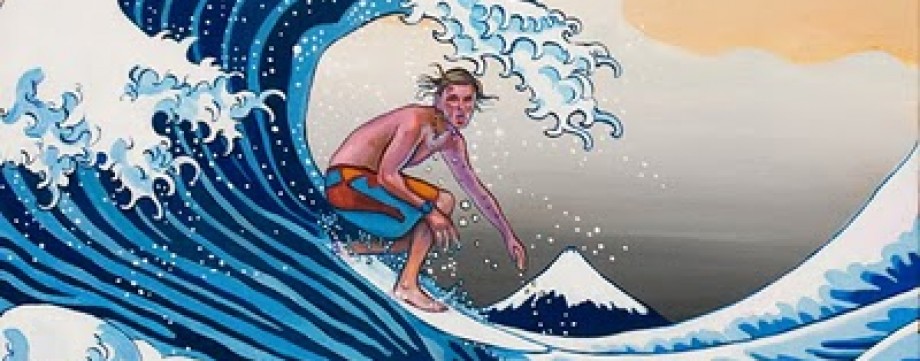Words Best Left Unspoken (to Americans)
“In America, what do you call this?” The English teacher sitting next to me pointed his chopsticks toward my bento lunch box as we ate together. “This?” I picked up the round deep-fried dessert with my own chopsticks for a closer examination. “Ummm, Cream-Puff?” A smirk formed on my co-worker’s face as he spoke. “In Japanese, it’s shuukuriimu. What do you think when I say shuukuriimu?” I smirked as well as I reached toward my foot and made a scrubbing motion with my knuckles over the surface of my slippers. We burst out laughing, then immediately consulted an electronic dictionary to figure out why the heck the Japanese would give anything you put in your mouth a name sounding so much like “shoe cream”. Clearly it wasn’t borrowed from English. In this case the French word chou de la crem became Japanified into shuukuriimu. Hence began the silly conversation of ridiculous Japanese words that left me nearly choking on my rice, which I now happily present to you (minus the rice). Enjoy.
ポカリスエット – Pocari Sweat
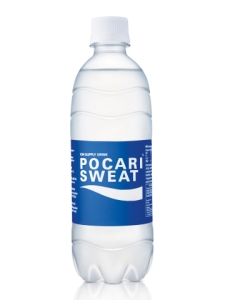
First up, beverages. Much more refreshing than it sounds, Pocari-sweat, along with its more aptly named rival, Aquarius, are two of the most popular sports drinks in Japan. Yet the mystery remains. Who is Pocari-san, and what is so special about his perspiration? Just try not to think of that as you hydrate, as it does have a slightly salty taste.
カルピス – Calpis
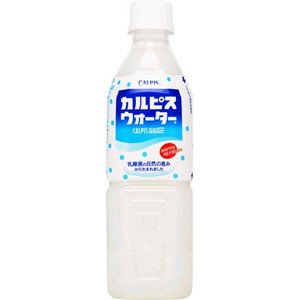
Try saying this one out loud five times fast and you’ll get the joke. Then ask yourself, would you prefer it hot or cold? The choice is yours at most convenience stores, for only about 150 yen.
バイキング – Viking

This refers to any all-you-can-eat buffet restaurant. It makes me wonder about my Scandanavian heritage and any possible relation to my oversized appetite. Perhaps the Japanese are on to something here…
最高! – saiko!

This is actually one of my favorite Japanese words. The characters literally translate to “most high”, and it is a popular slang phrase used to compliment someone who is exceptionally cool. Not too unlike our use of the word “awesome”. Next time you want to complement your best friend try telling her she’s saiko. See how that goes.
クリームコロン – Cream Collon
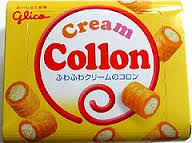
No, it has nothing to do with that. Collon is a rough Anglicization of the Japanese onomatopoeia korokoro, meaning “to lightly roll”.
大人味 – otona aji
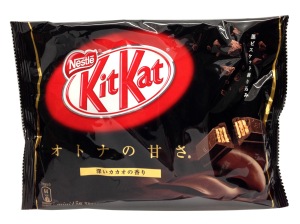
This one caused me a bit of confusion on my first encounter. I had recently learned these three characters, which literally translate to “adult flavor”. My question was why did my miso soup need to be adult flavored? And what does that even mean?! Then I started noticing it everywhere. Adult flavored rice seasoning… adult flavored chocolate… I was getting a little sketched out so I consulted a fellow English teacher, who explained that a better (more indirect) translation would be “mature flavor”. In other words, rich flavor. Phew.
キンキキッズ – Kinki Kids
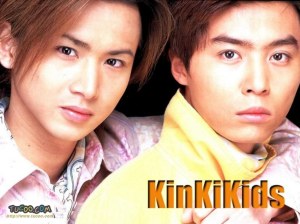
Speaking of “adult flavor”… Meet the hugely popular Japanese pop idol group from the 1990’s, off the major record label “Johnny’s Entertainment”. Oh boy, where do I begin? First of all, Kinki is derived from the characters 近畿, meaning “area around the capitol”. Although not entirely synonymous, Kinki is a more traditional name for the Kansai region – the urban tri-city area of Japan containing Osaka, Kobe, and the ancient capital of Kyoto. These innocent young men were merely showing some pride for their home region of Japan, where I too have enjoyed living. In recent years the word “kinki” has fallen out of use in favor of the more popular term, “kansai”. So much so, that this year Kinki University officially changed its name to Kindai – an abbreviation of Kinki Daigaku (daigaku means university). Imagine asking your mom for permission to study abroad at “Kinki University”, and you can probably guess why.
ふうか – Fuka
A largely popular girls name. I would advise adopting a nickname before departing on that study abroad program in New York City, miss Fuka.
ゆう – Yu
Another very popular girls name. Who? Me? No, you!
Gary – ゲリ
Here’s a little English to Japanese bonus. Any Garys out there planning a vacation to Japan should be advised. When pronounced by any Japanese person, the name Gary will inevitably end up sounding like geri. Now, it’s popular for foreigners living in Japan these days to find cool kanji for their names. Mine for example is 序新 – pronounced jonii and roughly meaning “new beginning”. Geri-san, however, should be warned against such a notion. When a Japanese person hears the word geri, their initial thought will most certainly be 下痢, meaning diarrhea.
